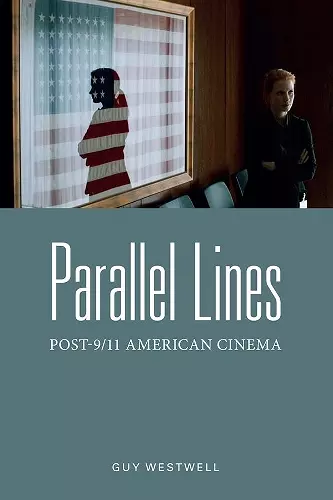Parallel Lines
Post-9/11 American Cinema
Format:Paperback
Publisher:Columbia University Press
Published:24th Oct '14
Currently unavailable, and unfortunately no date known when it will be back

Parallel Lines describes how post-9/11 cinema, from Spike Lee's 25th Hour (2002) to Kathryn Bigelow's Zero Dark Thirty (2012), relates to different, and competing, versions of US national identity in the aftermath of the September 11 terrorist attacks. The book combines readings of individual films (World Trade Center, United 93, Fahrenheit 9/11, Loose Change) and cycles of films (depicting revenge, conspiracy, torture and war) with extended commentary on recurring themes, including the relationship between the US and the rest of the world, narratives of therapeutic recovery, questions of ethical obligation. The volume argues that post-9/11 cinema is varied and dynamic, registering shock and upheaval in the immediate aftermath of the attacks, displaying capacity for critique following the Abu Ghraib prisoner abuse scandal mid-decade, and seeking to reestablish consensus during Obama's troubled second term of office.
Parallel Lines is the definitive statement on American cinema's responses to the September 11, 2001 terrorist attacks. Countless writers have weighed in on the effects of the 9/11 attacks, often reflexively perceiving them as wholly transformative of American culture, including virtually all activity in US screen industries. Guy Westwell does an end-run around the lazy shorthand that accompanies much of the discursive claims about 9/11 and cinema. Parallel Lines shows us how politicians, filmmakers, and cultural commentators perceived the events of September 11 and how screen texts distilled these attitudes into a narrow set of textual articulations involving unity, vengeance and victimisation. Ranging across mainstream Hollywood film, independent cinema, television documentary, and output from the fringes of the ideological spectrum, Westwell's book rigorously investigates the many cycles of films that appeared in the wake of 9/11 and the subsequent Iraq War. With sustained close readings, sure-footed argumentation, and meticulous attention to print news and commentary, Westwell's coverage give us an essential account of how cultural productions respond to monumental disasters and disruptions. -- Mark Gallagher, University of Nottingham, UK; author of Action Figures: Men, Action Films and Contemporary Adventure Narratives Lucid and compelling, Parallel Lines views American cinema of the post-9/11 period as a charged engagement with fundamental issues of national identity. Exploring a wide range of films, Westwell provides the most articulate and textually detailed analysis of this wrenching period that I have read. This important book will shape arguments about the post 9/11 cinema for many years to come. -- Robert Burgoyne, University of St. Andrews, UK; author of The Hollywood Historical Film and Film Nation: Hollywood Looks at US History With thoroughness, clarity and good sense, Westwell's Parallel Lines provides an authoritative route through the jingoism and contradictions characterising post-9/11 US cinema. Delineating the various stages and themes of post-9/11 US film, this highly informative book will prove a godsend to those trying to make sense of the period. In its keen understanding of social-historical events and skilful but nuanced film analyses, the book achieves that rare thing for Film Studies - properly contextualised, and politically astute, work. -- Michele Aaron, University of Birmingham, UK; author of Death and the Moving Image: Ideology, Iconography and I This volume provides a compelling and comprehensive tour d'horizon of the post-9/11 cinematic landscape. It blends thematic analysis with filmic vignette and in so doing will ensure that academic staff, students and the general reader will profit from reading this account. Strongly recommended. -- Klaus Dodds, Royal Holloway, University of London; co-author of International Politics and Film: Space, Vision, Power Anyone wishing to understand the cultural politics of post-9/11 America should read this book. It clearly shows the role that cinema has played in the "national conversation" that has taken place in the United States over the course of the "war on terror", and perhaps more importantly, does so without reducing film to simplistic pro-war/anti-war binaries. This book deserves to be read widely both within and beyond film studies. -- Sean Carter, University of Exeter, UK; co-author of International Politics and Film: Space, Vision, Power Comprehensive in its materials, nuanced in its analysis - the definitive account of American cinema after 9/11. -- Astrid Erll, Goethe-University, Frankfurt am Main [A] cogent examination of post-9/11 American cinema... Recommended. Choice Well written, comprehensive and accessible. Screen
ISBN: 9780231172035
Dimensions: unknown
Weight: unknown
240 pages